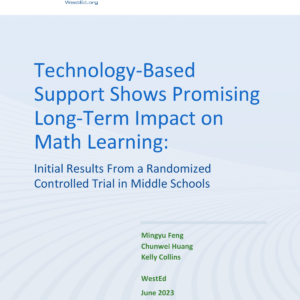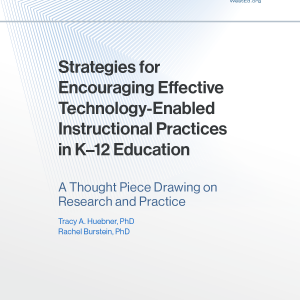New Research Shows Promising Outcomes for Digital Learning Program That Supports Math Learning
Posted on

In recent years, digital learning programs have gained popularity in K–12 classrooms. This surge in digital learning programs was accelerated by the COVID-19 pandemic, which prompted educators to rapidly shift their instruction online to reach students at home. Now, in the wake of the pandemic, educators must confront students’ learning loss, especially in mathematics. Last year’s National Assessment of Educational Progress (NAEP) report showed the biggest drop in 4th and 8th graders’ math performance since the assessment’s inception in 1990.
Opportunity gaps for students of color and students living in underserved communities also widened during the pandemic. As digital learning programs continue to rise in popularity to address students’ learning recovery and narrow math achievement gaps, it is crucial for educators to understand the long-term efficacy of such programs through evidence-based research.
A WestEd study recently examined the impacts of a widely used formative assessment platform, ASSISTments, which aids middle school students’ learning in math. The randomized controlled trial replicates a 2016 study and investigates the long-term effects of the ASSISTments program on student learning within a diverse student population that more closely mirrors the demographics of the student population across the nation. The study found that the digital learning program accomplished the following:
It positively impacted student learning in the long term. Even a year after the intervention ended, students in schools that used the program had higher end-of-grade math assessment scores compared to those in schools that did not use the program.
It helped narrow gaps in math assessment scores between students of color and White students. Prior to participating in the study, students of color in intervention schools and those in comparison schools had lower end-of-grade math assessment scores than did White students in both groups. However, 1 year after the intervention, students of color in intervention schools scored higher than White students in intervention schools after adjusting by their incoming 6th grade scores, while students of color in schools that did not use the program had unchanged test scores.
It especially benefited students in schools with more students from economically disadvantaged backgrounds. Students in intervention schools that had a higher percentage of students from economically disadvantaged backgrounds benefited more than students in schools that also used the program but had a lower percentage of students from economically disadvantaged backgrounds.
“Put broadly, the long-term results suggest that edtech programs that support teachers in using data to drive instruction and support students’ independent practice can help generate effective loops of instructional practices that can prepare students better for future learning,” says Dr. Mingyu Feng, Principal Investigator and Research Director for Learning and Technology at WestEd.
The study’s findings contribute to an increased understanding of the potential for educational technology to advance math learning, address students’ pandemic-induced learning loss, and confront opportunity gaps for students. The study underscored the significance of effectively implementing digital learning programs in classrooms to meet the needs of all students and advance equitable educational outcomes.
Beyond student performance and implementation considerations, the study emphasized the importance of building an evidence base for educational technology programs in the classroom. It is among a limited number of studies that examine the long-term effects of widely available educational technology programs, and the findings will ultimately help schools, districts, and states make informed decisions about digital learning as they move forward.
Download and read the full research report for more details.
Learn more about the ASSISTments project.
Subscribe to the WestEd E-Bulletin to stay tuned for further in-depth research findings.


